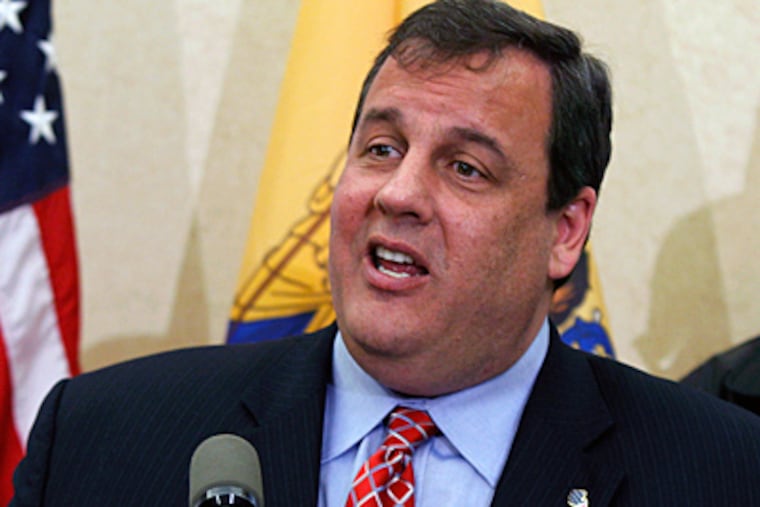Christie discounts Princeton study on "millionaire's tax"
A faint voice can be heard from the left side of statehouses across the land. "Tax the rich," it cries.

A faint voice can be heard from the left side of statehouses across the land.
"Tax the rich," it cries.
New Jersey Republican Gov. Christie recoils at those words. More taxes in a state that has the highest local tax burden in the United States - 12.2 percent of income, according to the nonpartisan Tax Foundation?
Never, Christie has vowed.
Try to increase the so-called millionaire's tax, he warned, and all those business owners who hire people will flee to more tax-friendly environs. "This is a tax which has proven to be destructive to job creation in states, and that's why states all over the country are rejecting it," Christie said.
With a millionaire's tax, your son or niece will never get a job in this tough economy, Christie reasoned at a recent town-hall meeting, because "the long, ugly, hairy hand of Trenton is coming to take that [hiring] money."
But that doomsday scenario is bogus, according to a study to be published in the June issue of the National Tax Journal.
Charles Varner, a doctoral candidate in sociology at Princeton University, and Cristobal Young, an assistant professor of sociology at Stanford University, were given special access to New Jersey tax returns to determine the effect of the millionaire's tax, which Gov. Jim McGreevey approved in 2004. They studied tax filings from before and after the tax was instituted, and compared the affected "millionaires" (those earning more than $500,000) to the slightly less rich ($200,000 and above).
"We estimated that 70 tax filers, single or families, moved because of the tax over the four-year period," Varner said in an interview.
That was just 0.04 percent of the millionaires in New Jersey. And retirees or those living off their investments - not business owners - are most likely to leave, the study found.
Not only don't high taxes necessarily cause the job-creating rich to pack up their McMansions and drive their Maseratis to Florida, but the authors hypothesize that it may simply be financially infeasible for business owners to relocate their operations elsewhere.
The sociologists picked New Jersey in part because it increased the tax rate for the richest far more than any other state from 2000 to 2007, and also because it borders three other states where millionaires could conceivably move while keeping their country club memberships.
"I'm shocked to know that a liberal professor from Princeton believes in higher taxes on rich people," Christie said when asked about the study. "What's your next news flash? That President Obama's running for reelection?"
Christie often points to his Democratic counterpart in New York, Gov. Andrew Cuomo, who blocked a millionaire's tax there.
"When you're dealing with professors, certain things that are theoretical are interesting, but guys like me and Andrew Cuomo have to deal with what's real, and what's real is what happens on the ground," Christie said. "And what happens on the ground is, when they raise taxes, people leave to go other places, because they're the most mobile people to begin with."
Somewhat ironically, Christie countered the Varner study with one of his own. Last year, the Center on Wealth and Philanthropy at Boston College reported that $70 billion in wealth left New Jersey due to tax hikes when Democrats ran the state, between 2004 and 2008.
And the Christie administration has other data to show that most millionaires are small-business owners. The Treasury Department said that in 2009, 71 percent of the millionaires filing tax returns also filed a form showing that they received income from a small business or investments.
"If you think 'It's just a millionaire's tax, and that doesn't really affect me' - they're coming after you next," Christie told a crowd of senior citizens this week.
Democrats have yet to unite behind a proposal to raise taxes in New Jersey. But they still don't buy the governor's argument.
"I don't have a lot of millionaires come up to me at the Wawa when I'm buying my Daily News and say, 'You know, that millionaire's tax is crushing me,' " Assemblyman Louis D. Greenwald (D., Camden) said at a recent budget hearing. "I've got people that are coming to me at the Wawa, at church, at the kids' Little League field, saying, 'What in the world is going on with my property taxes?' "
Property taxes have gone up as Christie's empty-pocketed state government makes cuts that trickle down.
For his part, Varner wishes politicians would take a deep breath and listen to some hard data.
"We're not activists, we're academics - I hope they'll use our findings," he said.
"It would be nice if politicians looked at our study, and others, in making decisions. Unfortunately, there's often cursory use of data; not a whole lot of in-depth work goes into figuring out who's right."